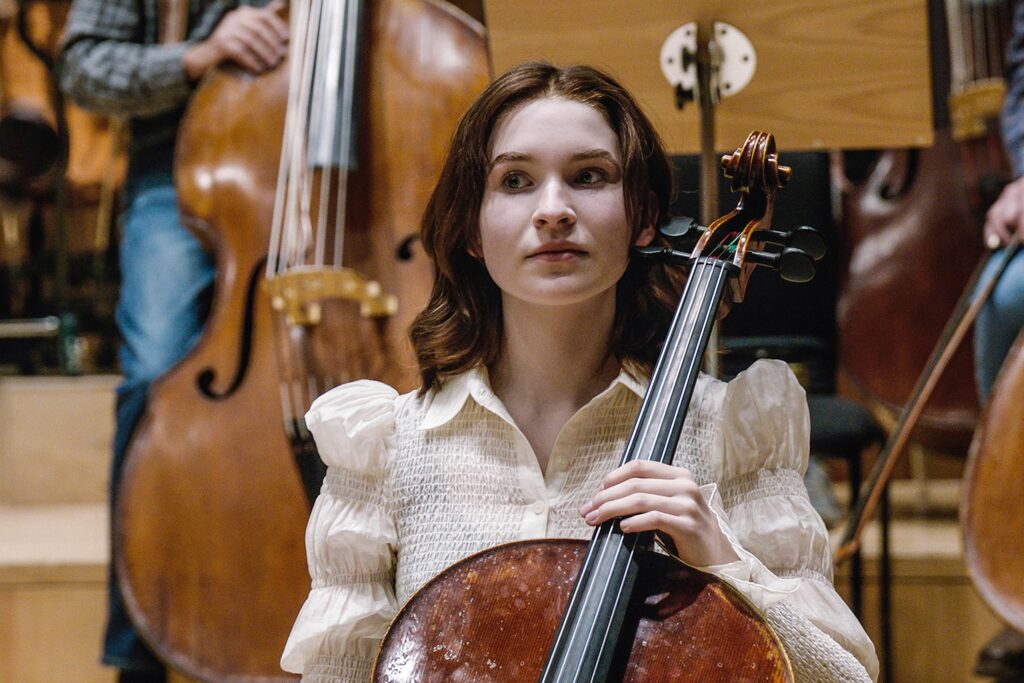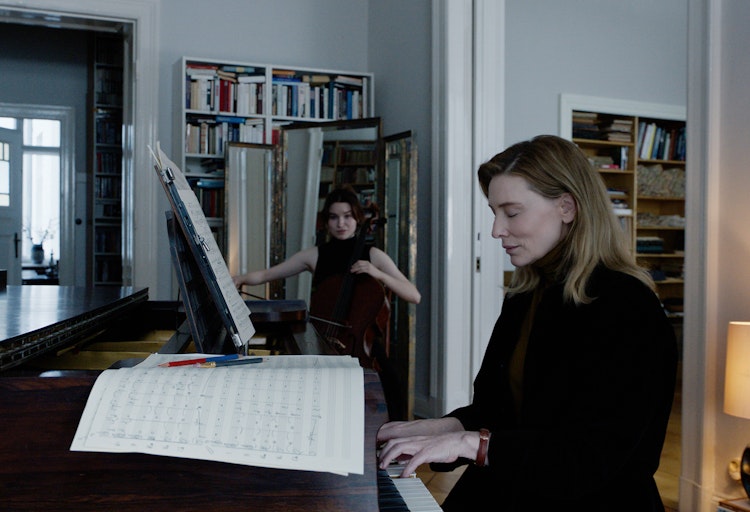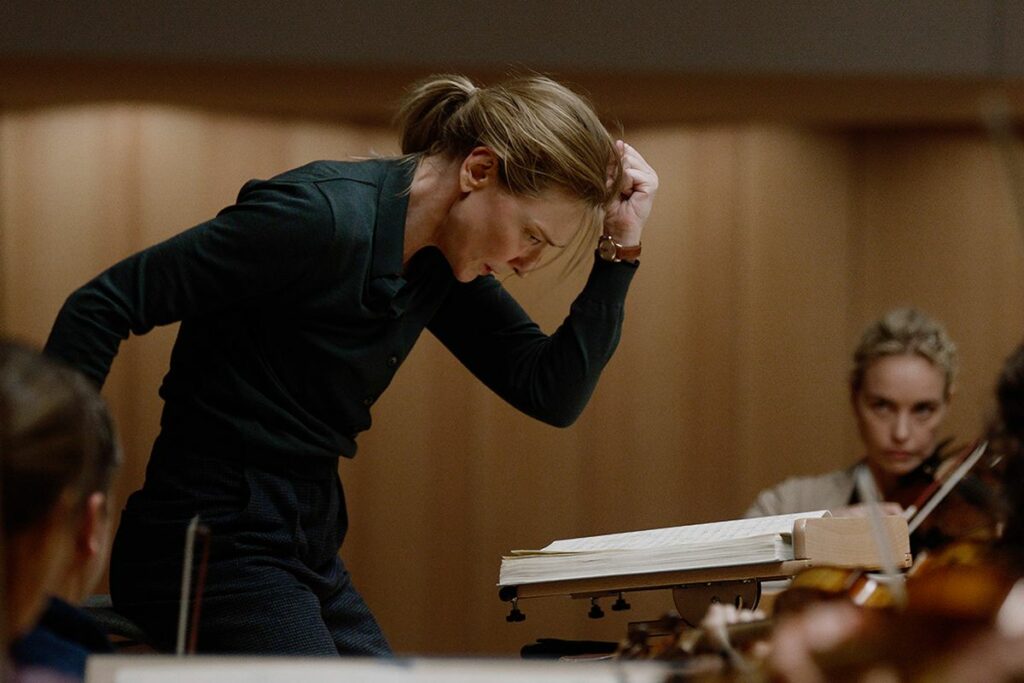British-German cellist Sophie Kauer makes her big screen debut as Olga Metkina in Todd Field’s critically acclaimed, award-winning biopic, Tár. Kauer – only 19 years old at the time of casting – stars as a gifted Russian cellist and most recent addition to the Berlin Philharmonic, where Cate Blanchett’s world-renowned Lydia Tár is chief conductor.
Tár is about to undertake one of her career’s most difficult challenges: a live recording of Gustav Mahler’s Symphony No. 5. But as questions about her relationship with a troubled former student emerge and young student Olga catches Tár’s eye, the American maestro’s professional life starts to teeter towards disaster.
Now, Tár is sweeping its way across the awards circuit, with many expecting Blanchett to receive this year’s Best Actress Academy Award. Starring right opposite her and accompanying the film’s soundtrack with live recordings is Kauer – quite the role for a student at the Norwegian Academy of Music who had never acted before.
Outtake spoke with Kauer about classical music, learning to act from Blanchett, and how Tár gracefully tackles some of today’s most urgent subjects.

You sent an audition tape after a casting call went out to a bunch of music schools, not expecting you’d hear back. How did it feel learning you’d landed the role?
Sophie Kauer: No one explicitly told me that I had the part! They sent me emails saying I’d been approved by the studio and that I was at the top of a very short list. But like I said, it’s so far from my everyday reality, and I hadn’t understood the magnitude of the project.
It was only when I was actually on a call with Todd, and he was like, “I’m gonna send you the script, but there are some things you should know before you read it”. And I was like, “Wait, have I got the part?” and he went, “Yes, did no one tell you?”.
I remember I called my mum and dad and shrieked quite loudly. I felt sorry for my neighbours! It was crazy, and I couldn’t tell many people because of the NDAs. I told my best friend, though, and she was like, “See, I told you!”. She had a weird feeling that I would get it, the whole way through.
It’s that best friend Spidey-sense.
Sophie Kauer: She’s so lovely, but she takes pictures of me on the tube eating on the go and calls it “movie star on the metro”. And I look like an absolute numpty every time. She makes fun of me all the time, in a very lovely way. She’s the best.
You said Todd Field wanted to preface the script with a couple of things. Do you remember what he wanted to say?
Sophie Kauer: It’s hard to remember. He told me we’d be working with Cate and the Dresden Philharmonic and that Hildur Guðnadóttir was going to be writing the music. And I just thought, “wow, this project is going to be so authentic!”. And then I read the script, which was so well-researched that I was blown away. No one’s ever made a movie that features classical music so heavily and so accurately before. And add to that the fact that it’s a very relevant film that tackles many issues we face in the 21st century, and it is just mind-blowing.
It’s just such a beautifully constructed script; it’s almost like a novel. The stage direction, too, is so beautiful. I remember, in particular, there’s a scene where the orchestra are deciding that Elgar’s Cello Concerto is okay to pair with Mahler’s Fifth, and the direction describes them raising their bows in the air like a forest growing denser.
Todd is the most multi-talented person ever – he’s a musician, actor, director, writer, and sound engineer. That’s why the film ends up being the way it is, because he’s so detail-oriented.

This is both your first acting role and a demanding musical performance; how did you prepare?
Sophie Kauer: I realised that I had a mountain to climb in terms of the challenges of recording live takes, and I’d have to be playing the cello like someone else. I wanted to be as prepared as possible, so I rehearsed the pieces a lot. We also did a lot of preparation for the accent – that was about a month or so of Zoom dialect lessons before I got to set. I think that really helped me get into character, and the dialect coaches were so lovely.
Todd and Cate also made a very safe environment for me on set, and I trusted them a lot. So, if something wasn’t up to standard, I knew that they would say something. Todd and I also had lots of discussions as to what Olga’s thoughts and feelings would be, her backstory, and what her reactions would be to certain scenes. I’ve always been really interested in people’s psychology and in what makes them tick – my mum’s a psychologist, so it’s always been part of my life. Maybe that’s creepy, but I’ve always been fascinated by it.
It’s true that Olga is a very ambiguous character – you never know whether she’s playing it straight or whether she’s working an angle. What did Todd tell you about her agenda?
Sophie Kauer: He always wanted to keep it ambiguous, even with me. I don’t even know the entirety of the character. She’s come from a very cushy background and has grown up with a family of musicians, so she’s used to getting opportunities her way. She’s also used to doing well, which is probably why she’s so self-confident, though that doesn’t mean she doesn’t appreciate it. You can see how excited she gets when she achieves something. I would say that it was very much a discussion about her relationship with Lydia, but we try to leave a lot of ambiguity there too. I think it makes the story and the message much more powerful when all’s left up to the audience to decipher.
Speaking of, it must be pretty daunting to do your very first press tour and have to discuss controversial issues like cancel culture and sexual harassment. How have you handled that?
Sophie Kauer: [Laughs] Yeah, I don’t think there are many other 21-year-olds who have to answer these questions. But I’m really lucky that I have the opportunity to think and talk about things that are so important to me and to advocate for and destigmatise a music industry that I love so much. Change doesn’t come without discussions, so I’m just really happy that I get to help in some small way. I’m just blown away that people are interested in what I have to say!

It must feel good, too, to fairly represent an art form on screen that many people still deem somewhat niche and elitist.
Sophie Kauer: That always really upsets me.
I understand, but it must be nice for you to get the opportunity to challenge those preconceptions.
Sophie Kauer: That’s really nice of you to say, thank you. I find it interesting that people never react that way with a science fiction movie. You accept that the astronaut knows what they’re doing and will be able to navigate their way around a spaceship – even if you don’t understand what they’re saying. For me, it’s the same; you accept that Lydia Tar is highly specialised, and all the name-dropping adds to the world-building. What I found really amazing is that everyone seems to think she’s a real person or that she’s based on a real-life conductor. But it’s actually just that Todd is amazing! He’s the same with all his films, he creates these incredibly multi-dimensional characters. I think he also talked to John Mauceri about world-building and classical music, and he helped him a lot with the research. But these were also questions that he’d been thinking about for a very long time and issues he’d always wanted to tackle in a way that would grab the audience’s attention. I was so delighted that someone took so much care to get it all right.
You said something interesting that I’d love if you could elaborate on. What did you mean when you said that you had to learn to play the cello as Olga?
Sophie Kauer: Well, Todd had a clear idea of how Olga would interpret and play the Elgar. We would sit down to shoot, and he’d be like, “I want you to take loads of time over this shift”, or “play that section really fast”. And I’m gulping because I know this is all live recording and that nothing will be edited in post. And obviously, playing it that way wasn’t how I’d practised, and a lot can go wrong. That was a baptism of fire; I had to learn to be very professional under challenging circumstances. It was quite an unusual thing to be made to play a piece differently from how you’d interpret it. That’s why it was so nice to be able to re-record it all later for the concept album with the London Symphony Orchestra at Abbey Road, because I played it how I interpreted it. If you listen to the two side-by-side, they’re pretty different.
Do you see yourself doing more acting?
Sophie Kauer: I had an immense amount of fun doing this project, but my number one passion is playing the cello. I have no plans to abandon that, but I also don’t see why I couldn’t do more acting if another amazing project came along. Plus, I think including other art forms enriches you as a person and musician. We’ll see how it goes!
Tár releases in cinemas from January 13th.
